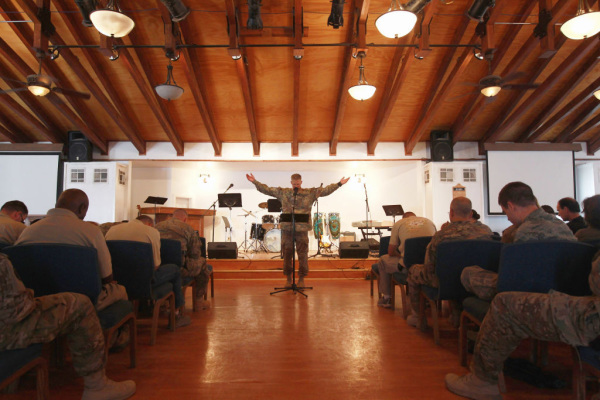Interview: Power and Status in the Early Church - Why It Matters Today
Dr. Joe Hellerman has just released his new book Embracing Shared Ministry: Power and Status in the Early Church and Why it Matters Today. His doctoral research dealt with the social history of the early Christians, and he has authored five books. In addition to a full time schedule teaching at Biola University's Talbot School of Theology, he's a team pastor at Oceanside Christian Fellowship in El Segundo, California. I recently caught up with Joe to ask him about how the early church dealt with issues like power and status and what it can teach Church leaders today.
Q: Your new book is Embracing Shared Ministry: Power and Status in the Early Church and Why it Matters Today. As the title describes, it's about power and status in the early Church. Why is that important for church leaders today?
Joe Hellerman: It is "social given" among human beings that "wherever two or more are gathered," leaders will emerge who will exercise power and authority over others in the groups they lead. This is true in every culture, in just about any social setting, including the church. God created us this way, and he made provisions for this very phenomenon in the Bible, by establishing church offices, along with necessary qualifications and character qualities for church leaders. Since the use (and abuse) of power tends to manifest itself somewhat differently at different times and places, it is important regularly to return to the Bible's teaching on the proper use of power and authority in order to evaluate current tendencies and practices.
In the present climate, in particular, the breakdown of the family, along with an influx of corporate business values and practices, has generated a volatile mix of ingredients in some of our churches: (1) a highly gifted, but emotionally dysfunctional and narcissistic leader, wielding CEO-like authority, who is (2) supported by elders or deacons whose metrics for ecclesiastical success find their roots in the Wall Street Journal, rather than in the letters of Paul. Sadly, this scenario often cashes out in a whole lot of relational hurt among associate staff and their families, who are on the receiving end of the abuse of authority by senior leaders who lack the relational straw to make bricks.
Q: The concept of "power" is controversial when it comes to churches and religious organizations. But power relationships exist. What do leaders today need to be most careful of when it comes to exercising the right kinds of power?
Hellerman: Power relationships will always exist, and that is not necessarily a bad thing. The key is how power is used in the context of those relationships-particularly as a leader relates to his or her subordinates. Dysfunctional, narcissistic leaders use their employees in the service of their own personal agendas, and they marginalize subordinates who challenge their thinking, or whose gifts or abilities they perceive to be a threat. Healthy leaders, in contrast, empower their subordinates, and they are delighted to see them succeed and even surpass their own accomplishments.
Q: Many churches today are led by dynamic single leaders. Why are teams important?
Hellerman: There are many reasons:
1. I simply find it counterintuitive to place the visionary future and spiritual guidance of a group of 200 (or 2,000!) believers in a local church in the hands of a single individual, given what we know from Scripture about (a) human brokenness and fallibility and (b) the importance of making decisions in community, rather than in isolation. Our natural families certainly don't function that way. I suspect that the only reason we think our church family ought to function that way is that we've bought into a corporate model of ministry that has no precedent in early Christianity.
2. Because of "the volatile mix of ingredients" outlined in answer to Question #1, above. These cultural tendencies make in particularly important, today, to spread authority across a community of leaders, rather than to concentrate it the hands of a single, senior pastor figure.
A team approach also provides more balanced teaching and modeling of the Christian life, and it challenges the tendency of our people to view these "dynamic single leaders" as spiritual celebrities, of sorts (another characteristic, by the way, identified by social scientists, which marks the relationship between toxic leaders and their followers).
Q: How do we avoid the abuse of authority in the Church today?
Hellerman: Well, it's not rocket science, but it will involve a profound paradigm shift for numbers of church leaders. The general answer is that pastors need to be in relationship with others in their churches who hold them accountable for the ways they exercise authority.
Q: Give me some examples of what you call "corporate Christianity," and why we should avoid it.
Hellerman: Perhaps most problematic is the use of Sunday attendance and church finances as the sole metrics for successful ministry. It never ceases to amaze me how much relational hurt and chaos lay leaders (elders and deacons) will tolerate, year after year, at the highest level of church leadership (i.e., between a pastor and his staff), as long has the pastor's prodigious gifts continue to fill the pews and the plates with people and money.
Q: When we talk about subjects like "team leadership" or "power and influence," we usually think of megachurches or large ministry organizations. But most churches in American are less than 200 people. Are these issues just as important for pastors of small churches? And if so, why?
Hellerman: Well, the issue relates more to the leader than to the size of his church. A healthy leader will not abuse his authority, regardless of the size of his church, and we have many, many wonderfully healthy pastors out there. The problem, of course, is that we have fewer and fewer genuinely emotionally healthy young people graduating from our seminaries, for reasons outlined above. So, large church or small church, I think pastors need to be deeply embedded in community with a handful of others in the church who have permission to speak into their lives in ways that are sometimes awkward and painful.
Q: The word "authentic" gets used a lot in the Church world today - many times in the wrong context. When you use the term "authentic Christian ministry" what do you mean, and why is it important?
Hellerman: By authentic Christian ministry, I mean that what is said about the Christian life on Sunday matches up with the dynamics of staff relationships in the church office during the week.
In the majority of our churches, if attendance is increasing and giving is up, it is assumed that the pastor is doing a good job, and there is little concern, for example, for the health of staff relations, or even, in some cases, for the quality of relationships among people in the congregation at large. David Platt's clever alliteration drives the point right home:
One of the unintended consequences of contemporary church strategies that revolve around performances, places, programs, and professionals is that somewhere along the way people get left out of the picture.
Rarer yet is the board that includes, as a key benchmark of successful ministry, healthy relationships among its staff. This is regrettable, because lay leaders who are satisfied solely with numerical and financial viability are generally quick to ignore the kind of staff disunity often generated by a highly gifted but emotionally needy senior pastor. As long are there are people in the pews and money in the plates, the pastor gets his "Atta-boys!" and the institution charges ahead. Hurtful relational dysfunction around the church office is simply dismissed as inconsequential-the price of doing business.
Yet healthy staff relations ought to be an absolutely non-negotiable measure of effective Christian ministry. Why? Because the church is first and foremost a relational community. If we cannot make relationships work in the church office, among our spiritual leaders, something has gone seriously awry.
Stop and think about just how counterintuitive it is, biblically, to prioritize institutional values like Sunday attendance and finances over healthy relationships among a pastor and his staff. Jesus said that the world will know we are his disciples by our love for one another (John 13:35). Can a preaching pastor truly challenge his people with integrity to love one another, if he himself fails to encourage healthy relations among his co-laborers during the week? Here a corporate mentality has all but completely hijacked God's relational designs for his people. If we are not successful relationally-at the top, among our staff-then we might as well close up shop, send away our Sunday crowds, and refund their generous offerings.
Q: Finally, If you had one message for pastors and ministry leaders, what would it be?
Hellerman: God's church is to be led, instead, by a plurality of pastor-elders who relate to one another first as brothers in Christ, and who function only secondarily-and only within that primary relational context-as vision-casting, decision-making leaders for the broader church family.
__________
Kathleen Cooke is co-founder of The Influence Lab where she helps women become influencers in the media. Find out more at kathleencooke.com.






















